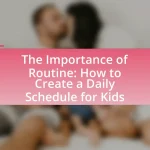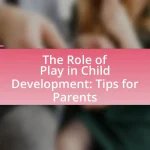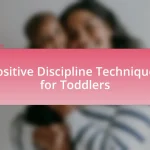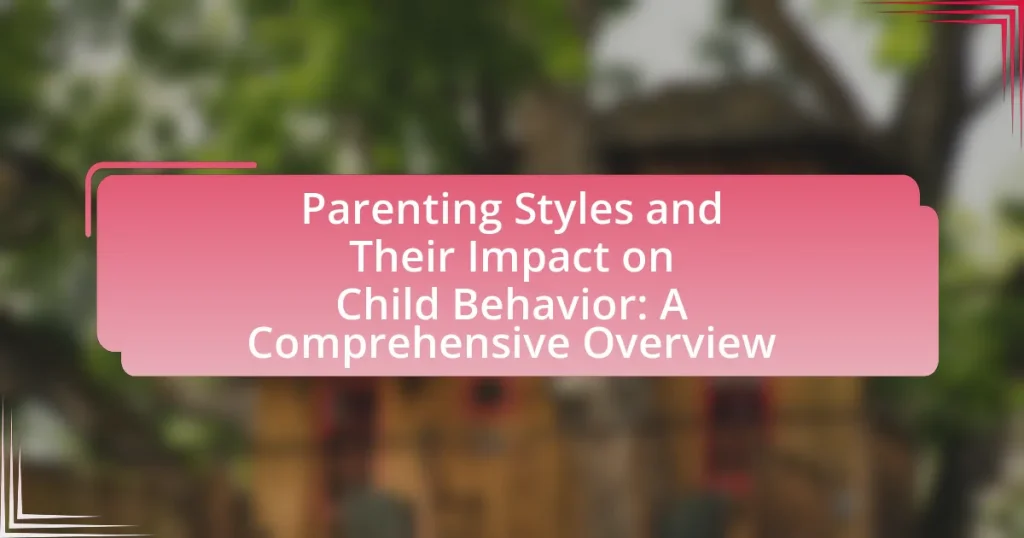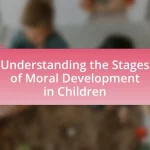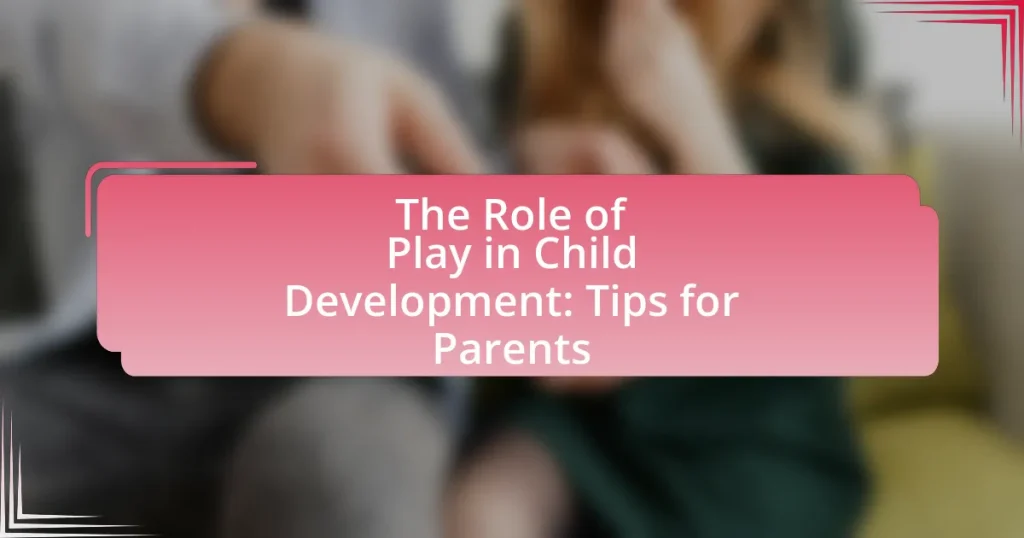Parenting styles are distinct approaches that parents use to raise their children, significantly influencing child development and behavior. The article outlines four primary parenting styles identified by developmental psychologist Diana Baumrind: authoritative, authoritarian, permissive, and neglectful. It discusses how each style impacts various aspects of child development, including emotional well-being, social skills, and academic performance. Authoritative parenting is linked to positive outcomes, while authoritarian and neglectful styles are associated with negative effects such as anxiety and low self-esteem. The article emphasizes the importance of understanding these styles to foster healthier parent-child relationships and promote better behavioral outcomes in children.

What are Parenting Styles?
Parenting styles are the distinct approaches that parents use to raise their children, which significantly influence child development and behavior. The four primary parenting styles identified by developmental psychologist Diana Baumrind are authoritative, authoritarian, permissive, and neglectful. Research indicates that authoritative parenting, characterized by warmth and structure, is associated with positive outcomes in children, such as higher academic performance and better social skills, while authoritarian parenting often leads to increased anxiety and lower self-esteem in children.
How do different parenting styles influence child development?
Different parenting styles significantly influence child development by shaping children’s emotional, social, and cognitive growth. Authoritative parenting, characterized by warmth and structure, tends to foster self-esteem and social competence in children, as evidenced by research from Baumrind, which shows that children raised in such environments often exhibit better academic performance and social skills. In contrast, authoritarian parenting, which emphasizes strict rules and obedience, can lead to children developing lower self-esteem and higher levels of anxiety, as indicated by studies that link this style to increased behavioral issues. Permissive parenting, marked by indulgence and a lack of boundaries, may result in children struggling with self-regulation and authority, as highlighted in research that connects this style to impulsive behavior. Lastly, uninvolved parenting, characterized by neglect, is associated with negative outcomes such as attachment issues and poor academic performance, supported by findings from the National Institute of Child Health and Human Development. Thus, the type of parenting style employed directly correlates with various aspects of child development, influencing their future behavior and emotional well-being.
What are the key characteristics of authoritative parenting?
Authoritative parenting is characterized by a balanced approach that combines high responsiveness and high demands. Parents who adopt this style set clear expectations and rules while also being supportive and nurturing. Research indicates that children raised by authoritative parents tend to exhibit higher levels of self-esteem, social competence, and academic success. A study by Baumrind (1991) highlights that this parenting style fosters independence and self-regulation in children, as authoritative parents encourage open communication and provide reasoning behind rules, which helps children understand the consequences of their actions.
How does authoritarian parenting differ from permissive parenting?
Authoritarian parenting is characterized by high demands and low responsiveness, while permissive parenting is marked by low demands and high responsiveness. In authoritarian parenting, parents enforce strict rules and expect obedience without much room for dialogue, often leading to children who may be obedient but lack self-esteem and social competence. Conversely, permissive parenting allows children significant freedom and autonomy, which can foster creativity and self-expression but may result in a lack of discipline and responsibility. Research indicates that children raised in authoritarian environments may exhibit higher levels of anxiety and lower levels of social skills, while those from permissive backgrounds may struggle with authority and self-regulation.
What impact does neglectful parenting have on children?
Neglectful parenting significantly harms children’s emotional and psychological development. Children raised in neglectful environments often experience low self-esteem, increased anxiety, and difficulties in forming healthy relationships. Research indicates that neglectful parenting correlates with higher rates of behavioral issues, such as aggression and delinquency, as children may seek attention through negative actions when they lack emotional support. A study published in the Journal of Child Psychology and Psychiatry found that children from neglectful backgrounds are more likely to develop mental health disorders, highlighting the long-term consequences of this parenting style.
Why is understanding parenting styles important?
Understanding parenting styles is important because they significantly influence a child’s emotional, social, and cognitive development. Research indicates that different parenting styles—authoritative, authoritarian, permissive, and uninvolved—affect children’s behavior and personality traits. For instance, a study published in the Journal of Family Psychology found that children raised by authoritative parents tend to exhibit higher levels of self-esteem and better social skills compared to those from authoritarian or permissive backgrounds. This highlights the critical role that parenting approaches play in shaping a child’s future outcomes.
How do parenting styles affect children’s emotional well-being?
Parenting styles significantly influence children’s emotional well-being by shaping their self-esteem, social skills, and coping mechanisms. Authoritative parenting, characterized by warmth and structure, is associated with higher emotional resilience and better social competence in children. In contrast, authoritarian parenting, which emphasizes strict discipline and low emotional support, can lead to increased anxiety and lower self-esteem among children. Research by Baumrind (1991) indicates that children raised in authoritative environments tend to exhibit greater emotional stability and better interpersonal relationships. Additionally, a study published in the Journal of Family Psychology found that children with permissive parents may struggle with self-regulation, leading to emotional difficulties. Thus, the type of parenting style directly correlates with various aspects of children’s emotional health.
What role do cultural factors play in parenting styles?
Cultural factors significantly influence parenting styles by shaping beliefs, values, and practices regarding child-rearing. For instance, collectivist cultures often emphasize interdependence and community, leading to authoritative or permissive parenting styles that prioritize group harmony and obedience. In contrast, individualistic cultures may promote independence and self-expression, resulting in more permissive or uninvolved parenting approaches. Research by Chao (1994) highlights that Asian American parents often adopt a “training” approach, reflecting cultural values of respect and discipline, which contrasts with Western ideals of autonomy. This demonstrates that cultural context directly affects how parents interact with their children and the expectations they set, ultimately impacting child behavior and development.
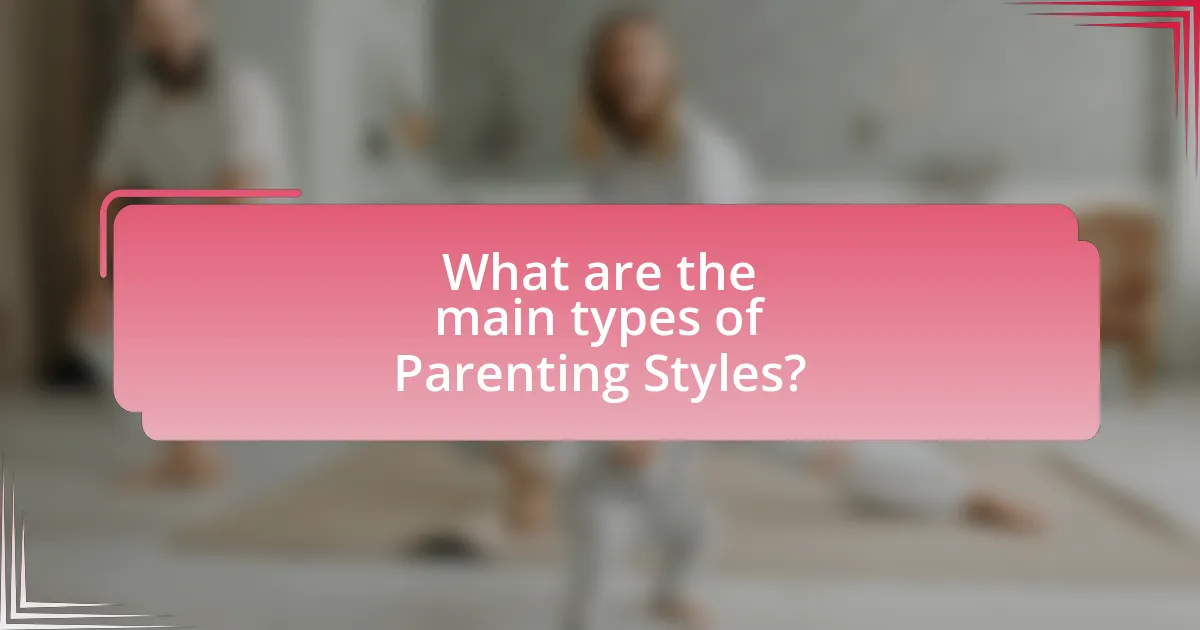
What are the main types of Parenting Styles?
The main types of parenting styles are authoritative, authoritarian, permissive, and uninvolved. Authoritative parenting is characterized by high responsiveness and high demands, promoting independence while maintaining limits. Authoritarian parenting involves high demands and low responsiveness, emphasizing obedience and discipline. Permissive parenting is marked by high responsiveness and low demands, allowing children significant freedom with few boundaries. Uninvolved parenting features low responsiveness and low demands, often resulting in neglect. Research by Baumrind in the 1960s established these categories, demonstrating their impact on child development and behavior.
What defines authoritative parenting?
Authoritative parenting is defined by a balanced approach that combines high responsiveness and high demands. This style emphasizes nurturing, support, and open communication while also setting clear expectations and boundaries for behavior. Research indicates that children raised by authoritative parents tend to exhibit higher levels of social competence, self-regulation, and academic success compared to those raised in other parenting styles, such as authoritarian or permissive. Studies, including those by Baumrind, have shown that authoritative parenting fosters independence and resilience in children, contributing positively to their overall development.
How does authoritative parenting promote independence in children?
Authoritative parenting promotes independence in children by balancing responsiveness and demandingness, which fosters self-regulation and decision-making skills. This parenting style encourages children to express their opinions and make choices within established guidelines, leading to increased confidence and autonomy. Research indicates that children raised by authoritative parents tend to exhibit higher levels of self-esteem and better problem-solving abilities, as they are given opportunities to navigate challenges with appropriate support. Studies, such as those by Baumrind, demonstrate that this approach results in children who are more capable of managing their own lives and making independent decisions.
What are the long-term effects of authoritative parenting on behavior?
Authoritative parenting leads to positive long-term effects on behavior, including higher levels of self-esteem, better social skills, and improved academic performance. Research indicates that children raised by authoritative parents tend to exhibit greater emotional regulation and resilience, which contributes to their ability to navigate social situations effectively. A study published in the Journal of Family Psychology found that adolescents with authoritative parents reported lower levels of depression and anxiety, highlighting the emotional benefits of this parenting style. Additionally, authoritative parenting fosters independence and responsibility, as parents set clear expectations while also providing support, which encourages children to develop decision-making skills.
What is authoritarian parenting?
Authoritarian parenting is a style characterized by high demands and low responsiveness. Parents who adopt this approach enforce strict rules and expectations, often valuing obedience and discipline over emotional support and open communication. Research indicates that children raised in authoritarian environments may exhibit lower self-esteem and higher levels of anxiety, as they often feel less capable of making decisions independently. Studies, such as those conducted by Baumrind in the 1960s, have shown that this parenting style can lead to children who are obedient but may struggle with social skills and self-regulation.
How does authoritarian parenting affect a child’s self-esteem?
Authoritarian parenting negatively affects a child’s self-esteem by fostering an environment of high demands and low responsiveness. Children raised under this style often experience a lack of emotional support and validation, leading to feelings of inadequacy and low self-worth. Research indicates that these children may struggle with anxiety and depression, as they internalize the strict expectations and criticism from their parents. A study published in the Journal of Family Psychology found that children with authoritarian parents reported significantly lower self-esteem compared to those with authoritative or permissive parenting styles, highlighting the detrimental impact of authoritarian practices on a child’s self-image.
What behavioral issues are commonly associated with authoritarian parenting?
Authoritarian parenting is commonly associated with behavioral issues such as increased aggression, anxiety, and low self-esteem in children. Research indicates that children raised in authoritarian environments often exhibit externalizing behaviors, including defiance and conduct problems, due to the lack of emotional support and open communication. Additionally, studies have shown that these children may struggle with social skills and have difficulty forming healthy relationships, as they are not encouraged to express their feelings or opinions. This parenting style’s emphasis on obedience and discipline can lead to a fear-based relationship between parents and children, further exacerbating these behavioral issues.
What is permissive parenting?
Permissive parenting is a style characterized by high responsiveness and low demands, where parents are lenient and indulgent towards their children. This approach often results in children having significant freedom and few rules, which can lead to challenges in self-discipline and authority acceptance. Research indicates that permissive parenting can contribute to behavioral issues, as children may struggle with boundaries and expectations, impacting their social interactions and academic performance.
How does permissive parenting influence a child’s social skills?
Permissive parenting negatively influences a child’s social skills by fostering a lack of boundaries and self-regulation. Children raised in permissive environments often struggle with understanding social norms and expectations, leading to difficulties in peer interactions. Research indicates that these children may exhibit higher levels of impulsivity and lower levels of cooperation, which can hinder their ability to form healthy relationships. A study published in the Journal of Child Psychology and Psychiatry found that children with permissive parents were more likely to display behavioral problems and less adept at managing social situations compared to those with authoritative parenting styles.
What challenges do children of permissive parents face in school?
Children of permissive parents often face challenges in school related to a lack of self-discipline and poor academic performance. This parenting style typically results in children having fewer boundaries and less structure, which can lead to difficulties in adhering to school rules and completing assignments on time. Research indicates that children raised by permissive parents may struggle with time management and organizational skills, as they are not accustomed to the expectations of authority figures. Additionally, these children may exhibit higher levels of impulsivity and lower levels of motivation, which can hinder their ability to succeed academically. Studies have shown that permissive parenting correlates with lower academic achievement and increased behavioral issues in school settings.
What is neglectful parenting?
Neglectful parenting is a style characterized by a lack of responsiveness to a child’s needs, both emotional and physical. This form of parenting often results in minimal supervision, inadequate provision of basic necessities, and emotional unavailability, which can lead to negative outcomes for the child, such as behavioral issues and emotional difficulties. Research indicates that children raised in neglectful environments are at a higher risk for developing problems such as anxiety, depression, and difficulties in social relationships, as highlighted in studies by the American Psychological Association.
How does neglectful parenting impact a child’s mental health?
Neglectful parenting significantly harms a child’s mental health by leading to increased risks of anxiety, depression, and behavioral issues. Research indicates that children raised in neglectful environments often experience feelings of worthlessness and low self-esteem, which can manifest as emotional and psychological disorders. A study published in the Journal of Child Psychology and Psychiatry found that children with neglectful parents are more likely to develop attachment issues and struggle with emotional regulation, further exacerbating mental health challenges.
What are the signs of neglectful parenting in children?
Signs of neglectful parenting in children include frequent absences from school, lack of supervision, and inadequate provision of basic needs such as food, clothing, and medical care. Children exhibiting these signs often display emotional and behavioral issues, such as low self-esteem, anxiety, and difficulty forming relationships. Research indicates that neglect can lead to long-term developmental problems, as highlighted in the study “The Impact of Neglect on Child Development” by the American Academy of Pediatrics, which emphasizes that neglectful parenting significantly affects a child’s emotional and social growth.
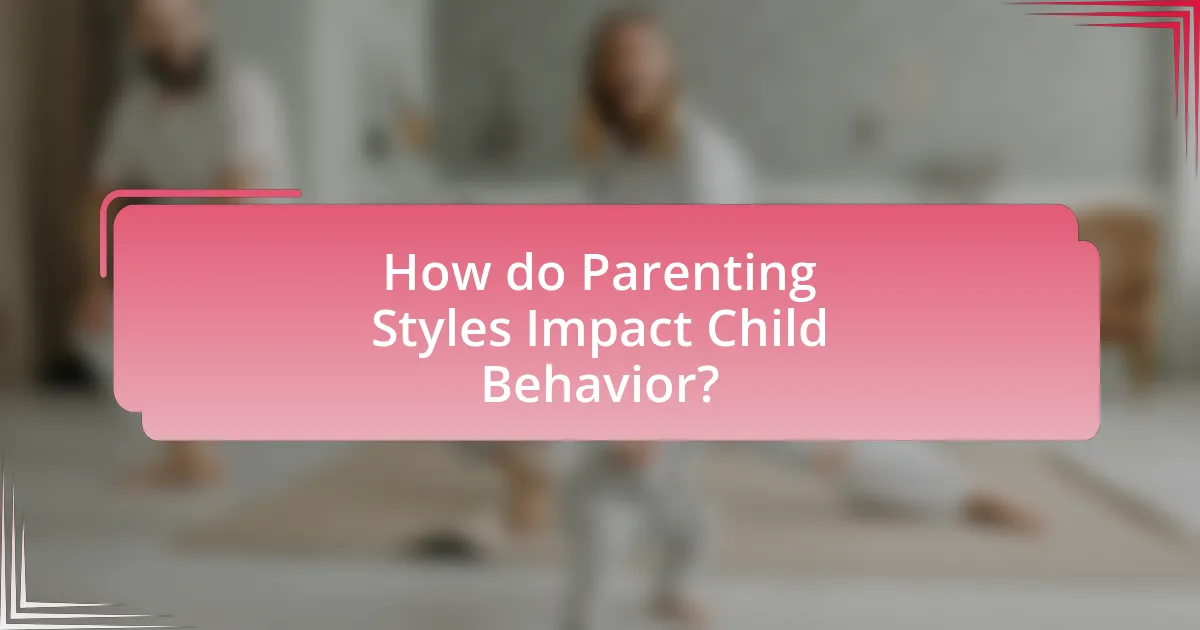
How do Parenting Styles Impact Child Behavior?
Parenting styles significantly impact child behavior by shaping their emotional and social development. Authoritative parenting, characterized by warmth and structure, often leads to children exhibiting higher self-esteem, better social skills, and lower levels of behavioral problems. In contrast, authoritarian parenting, which emphasizes strict rules and obedience, can result in children who are more anxious, less independent, and exhibit higher levels of aggression. Research by Baumrind (1991) highlights that children raised in authoritative environments tend to perform better academically and socially compared to those from authoritarian or permissive backgrounds. Thus, the approach parents take directly influences their children’s behavioral outcomes and overall well-being.
What behavioral outcomes are linked to authoritative parenting?
Authoritative parenting is linked to positive behavioral outcomes in children, including higher academic performance, better social skills, and lower levels of behavioral problems. Research indicates that children raised by authoritative parents tend to exhibit greater self-regulation and emotional maturity, which contributes to their ability to navigate social situations effectively. A study published in the Journal of Family Psychology found that children with authoritative parents scored higher on measures of social competence and academic achievement compared to those with authoritarian or permissive parenting styles. This evidence underscores the effectiveness of authoritative parenting in fostering desirable behavioral traits in children.
How do children raised by authoritative parents typically perform academically?
Children raised by authoritative parents typically perform better academically compared to those raised by other parenting styles. Research indicates that these children often exhibit higher levels of academic achievement, better grades, and greater motivation to succeed in school. A study published in the Journal of Educational Psychology found that children with authoritative parents scored significantly higher on standardized tests and had lower dropout rates, highlighting the positive correlation between authoritative parenting and academic success.
What social skills do children from authoritative homes develop?
Children from authoritative homes develop strong social skills such as effective communication, empathy, and conflict resolution. These skills arise from the balanced approach of authoritative parenting, which combines warmth and support with clear expectations and boundaries. Research indicates that children raised in such environments are more likely to engage in positive peer interactions and demonstrate higher levels of social competence, as they learn to express their feelings and understand others’ perspectives. Studies, including those by Baumrind, show that authoritative parenting fosters independence and self-regulation, further enhancing children’s ability to navigate social situations successfully.
What behavioral issues arise from authoritarian parenting?
Authoritarian parenting often leads to behavioral issues such as increased aggression, anxiety, and low self-esteem in children. Research indicates that children raised in authoritarian environments may exhibit higher levels of externalizing behaviors, such as defiance and conduct problems, due to the lack of emotional support and open communication. A study published in the Journal of Family Psychology found that children from authoritarian households are more likely to struggle with social skills and have difficulty forming healthy relationships, as they are conditioned to obey rules without understanding the rationale behind them. This parenting style can also result in emotional difficulties, as children may internalize their feelings, leading to depression and withdrawal.
How does authoritarian parenting affect a child’s relationship with authority figures?
Authoritarian parenting negatively affects a child’s relationship with authority figures by fostering fear and resentment rather than respect. Children raised in authoritarian environments often experience strict rules and harsh discipline, which can lead to a lack of trust in authority figures. Research indicates that these children may struggle with authority in later life, exhibiting defiance or withdrawal when interacting with teachers, employers, or law enforcement. A study published in the Journal of Family Psychology found that children with authoritarian parents are more likely to develop negative attitudes toward authority, as they associate authority with punishment rather than guidance. This dynamic can hinder their ability to form healthy relationships with authority figures throughout their lives.
What coping mechanisms do children from authoritarian homes develop?
Children from authoritarian homes often develop coping mechanisms such as compliance, emotional suppression, and avoidance. Compliance arises as these children learn to adhere strictly to rules and expectations to avoid conflict or punishment. Emotional suppression occurs as they may feel that expressing feelings is not acceptable, leading to internalized emotions and difficulty in emotional regulation. Avoidance manifests as a strategy to evade situations that could lead to disapproval or punishment, which can hinder their social interactions and problem-solving skills. Research indicates that these coping strategies can lead to long-term issues such as anxiety and low self-esteem, as children struggle to assert themselves and manage their emotions effectively.
What are the consequences of permissive parenting on behavior?
Permissive parenting often leads to children exhibiting behavioral issues such as impulsivity, lack of self-discipline, and difficulties in following rules. Research indicates that children raised in permissive environments may struggle with authority and exhibit higher levels of aggression and defiance. A study published in the Journal of Child Psychology and Psychiatry found that permissive parenting is associated with increased behavioral problems in children, as they may not learn to set boundaries or understand consequences for their actions. This lack of structure can result in challenges in social interactions and academic settings, as these children may not develop the necessary skills to navigate rules and expectations effectively.
How do children of permissive parents handle boundaries?
Children of permissive parents often struggle to understand and respect boundaries. This difficulty arises because permissive parenting typically involves a lack of consistent rules and limits, leading children to develop a sense of entitlement and difficulty in self-regulation. Research indicates that children raised in permissive environments may exhibit challenges in adhering to social norms and expectations, as they have not been taught the importance of boundaries through structured guidance. Consequently, these children may test limits more frequently and may have trouble with authority figures, as they are accustomed to a more lenient approach to discipline.
What behavioral problems are common in children raised with permissive parenting?
Children raised with permissive parenting often exhibit behavioral problems such as impulsivity, lack of self-discipline, and difficulties with authority. Research indicates that these children may struggle with emotional regulation and exhibit higher levels of aggression and defiance. A study published in the Journal of Child Psychology and Psychiatry found that permissive parenting is associated with increased behavioral issues, as children may not learn appropriate boundaries or consequences for their actions. This lack of structure can lead to challenges in social interactions and academic settings, reinforcing the negative impact of permissive parenting on child behavior.
What are the effects of neglectful parenting on child behavior?
Neglectful parenting leads to significant negative effects on child behavior, including increased aggression, anxiety, and difficulties in social interactions. Research indicates that children raised in neglectful environments often struggle with emotional regulation and exhibit behavioral problems, as they lack the necessary support and guidance from their caregivers. A study published in the Journal of Child Psychology and Psychiatry found that children with neglectful parents are more likely to develop externalizing behaviors, such as conduct disorders, and internalizing issues, like depression. These findings underscore the critical role that parental involvement plays in shaping healthy behavioral outcomes in children.
How does neglectful parenting influence a child’s ability to form relationships?
Neglectful parenting significantly hinders a child’s ability to form healthy relationships. Children raised in neglectful environments often experience emotional unavailability from caregivers, leading to difficulties in trust and attachment. Research indicates that these children may develop insecure attachment styles, which can manifest as anxiety in social situations or avoidance of close relationships altogether. A study by the American Psychological Association found that children with neglectful parents are more likely to struggle with social skills and emotional regulation, further complicating their ability to connect with peers and form lasting bonds.
What are the long-term behavioral consequences of neglectful parenting?
Neglectful parenting leads to significant long-term behavioral consequences, including increased risk of emotional and behavioral problems. Children raised in neglectful environments often exhibit higher levels of anxiety, depression, and aggression. Research indicates that these children may struggle with forming healthy relationships and exhibit difficulties in social interactions due to a lack of emotional support and guidance during formative years. A study published in the Journal of Child Psychology and Psychiatry found that neglectful parenting is associated with a greater likelihood of developing antisocial behaviors and substance abuse issues in adolescence and adulthood. These findings underscore the critical impact of neglectful parenting on long-term psychological and behavioral outcomes.
What practical strategies can parents use to adopt effective parenting styles?
Parents can adopt effective parenting styles by implementing consistent communication, setting clear expectations, and practicing positive reinforcement. Consistent communication fosters a trusting relationship, allowing children to express their thoughts and feelings openly. Setting clear expectations helps children understand boundaries and the consequences of their actions, which is essential for developing self-discipline. Positive reinforcement, such as praising good behavior, encourages children to repeat those behaviors, reinforcing a positive environment. Research indicates that these strategies contribute to better emotional regulation and social skills in children, ultimately leading to healthier parent-child relationships.
